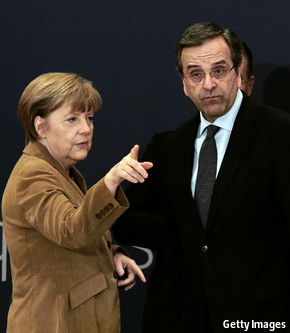Germany and Greece
Go if you must
Angela Merkel appears to have become more sanguine about a Grexit
 Merkel points the way for Samaras
Merkel points the way for Samaras
So it seemed after German officials leaked to Der Spiegel, a weekly, their assessment that Grexit would not only be bearable but might even make the euro stronger. Other problem countries have weathered the crisis (Portugal, Ireland) or are making progress (Spain). The euro zone now has a bail-out fund and a banking union. German banks and insurers have reduced their exposure.
On January 5th Steffen Seibert, Mrs Merkel’s spokesman, insisted that German policy had not changed: it still aimed to hold the euro zone together. Yet all sides are now debating Grexit. Some in Mrs Merkel’s Christian Democratic Union (CDU) said giving in to Greece would encourage other countries, including France, to rebel against spending cuts and supply-side reforms. Sigmar Gabriel, leader of the Social Democrats, Mrs Merkel’s coalition partners, said Germany must not be “blackmailed”.
Other Social Democrats recoiled from this tone. So did the CDU’s conservative Bavarian sister party. “We should not behave as a schoolmaster” to the Greeks, said Horst Seehofer, the Bavarian premier. The whole discussion was “irresponsible”, warned Simone Peter, a leader of the Greens. Sahra Wagenknecht, a leader of the ex-communist Left party, which sides with Syriza, accused Mrs Merkel’s government of “scare tactics” to influence the Greek election.
Carsten Nickel at Teneo Intelligence, a risk consultancy, thinks Mrs Merkel is trying to “send a strong signal to Athens” that aid would still be tied to reforms, but that she will be flexible. A deal with Mr Tsipras could include lower interest or longer maturities for Greek debt. But politics limit her room for manoeuvre. One change is the rise of the new anti-euro Alternative for Germany. It did well in state elections last year but is now riven by squabbles. Any softness on Greece will feed its support in Hamburg’s election in February. Public opinion remains sceptical. The tabloid Bild says that, if Greece can’t play by the rules, Germany should show it the “red card”.
This is the tightrope Mrs Merkel must walk after January 25th. Until then, she is likely to keep quiet. Even Austria, usually as strident as Germany on the euro, has struck a note of caution. Its finance minister, Hans Jörg Schelling, told a German newspaper that it was not appropriate to “meddle in the election campaigns of other countries”. That is the last thing Mrs Merkel can be seen doing.



No comments:
Post a Comment